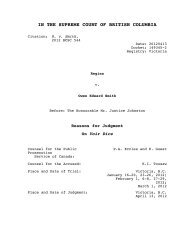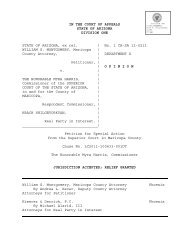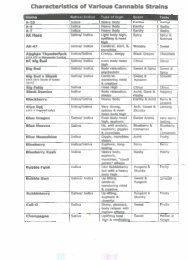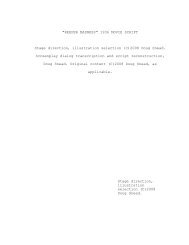3. Umbruch 4.4..2005 - Online Pot
3. Umbruch 4.4..2005 - Online Pot
3. Umbruch 4.4..2005 - Online Pot
You also want an ePaper? Increase the reach of your titles
YUMPU automatically turns print PDFs into web optimized ePapers that Google loves.
94 J. Fernández-Ruiz et al.<br />
same situation that HD in terms of pharmacotherapy to delay/arrest the<br />
progression of neurodegeneration, substances that reduce excitotoxicity,<br />
calcium influx, oxidative stress and/or inflammation being the only options<br />
assayed to date (for review, see [154, 155]), although the results obtained so<br />
far are not as promising as expected [155]. Since cannabinoid agonists share<br />
many of the above properties (for review, see [4–6]), they have been proposed<br />
as potentially useful neuroprotective substances also in PD, although the issue<br />
has been explored only very recently. However, their hypokinetic profile is a<br />
disadvantage in this case, because, despite their neuroprotectant activity in<br />
long-term treatments, they acutely enhance rather than reduce motor symptoms<br />
in this disease, as revealed by a few clinical studies [7, 156, 157]. This is<br />
compatible with the observation of overactivity in the endocannabinoid transmission<br />
in the basal ganglia in PD in both patients [158] and animal models<br />
[14, 131, 158–160]. This explains the hypokinetic profile of this disease and<br />
the recent proposal of CB 1 receptor antagonists to alleviate bradykinesia and<br />
rigidity, in particular at later phases of PD when L-dopa therapy is less effective<br />
(for review, see [7, 161]), although the first experiences in laboratory animals<br />
have been controversial [131, 162]. There would be only one exception<br />
for cannabinoid agonists to be used for symptom relief in PD; that is, patients<br />
for whom tremor is the major symptom. CB 1 receptor agonists might be useful<br />
to alleviate this symptom, due to the well-know inhibitory effect of<br />
cannabinoid agonists on glutamate release from subthalamonigral neurons<br />
[163], whose hyperactivity is responsible for tremor [117]. However, the only<br />
small clinical study carried out to test the effects of cannabinoids on parkinsonian<br />
tremor led to negative results [164].<br />
Coming back to the question of neuroprotection by cannabinoids in PD,<br />
recent preclinical studies carried out with ∆ 9 -THC have revealed that this compound<br />
could be also neuroprotective in PD [64]. The administration of ∆ 9 -THC<br />
reversed the impairment of dopaminergic transmission in the basal ganglia of<br />
rats with hemiparkinsonism caused by the unilateral application of 6-hydroxydopamine<br />
[64]. These effects did not occur in the contralateral structures,<br />
thus indicating that the effects of ∆ 9 -THC were produced by reducing<br />
dopaminergic cell death in the lesioned side rather than producing up-regulatory<br />
effects in surviving neurons [64]. The quantification of tyrosine hydroxylase<br />
mRNA levels in the substantia nigra of these animals corroborated this<br />
finding [64]. However, the fact that the same neuroprotective effects were<br />
elicited by CBD, another plant-derived cannabinoid with negligible affinity for<br />
the CB 1 receptor, suggests that these neuroprotective effects could be CB 1<br />
receptor-independent, based on the antioxidant properties of both<br />
plant-derived cannabinoids [64]. This observation is similar to the results<br />
reported by Hampson et al. [56], who compared the neuroprotective effects of<br />
∆ 9 -THC and CBD in rat cortical neuron cultures exposed to toxic levels of glutamate.<br />
This observation is particularly important in PD, a disease in which<br />
oxidative stress, together with excitotoxicity and mitochondrial failure, is a<br />
major hallmark in the pathogenesis of the disease [117].







